Tom Brokaw (39 page)

GEORGE SHULTZ
“My sergeant handed me a rifle and said, âTreat it like your
friend. Never point it at anyone unless you're prepared to
pull the trigger.' That's a very fundamental lesson.”
ARTHUR SCHLESINGER
“I am a short-term pessimist but a long-term optimist. I think
some future crisis will rally the country and bring out new
leaders. These are the cycles of history.”
T
WO MEMBERS
of the World War II generation who continue to be closely identified with their respective political parties appear to have little in common: George Shultz, a prominent and pragmatic cabinet officer in two Republican administrations, and Arthur Schlesinger, the keeper of the flame of the political philosophies of FDR and JFK, and one of America's most honored historians.
Shultz and Schlesinger are rooted in similar traditions. They both grew up in comfortable circumstances in the Northeast. Schlesinger's father was a prominent history professor. Shultz's father had a PhD in history but made his career on Wall Street. As young men, Schlesinger and Shultz attended elite prep schools, and both went on to earn doctorates in their own disciplines and become professors at Ivy League schools. After, that, however, their lives and their interests diverged.
George Shultz was a varsity letterman in two sports at Princeton, basketball and football, while Arthur Schlesinger was an exceptional history student at Harvard, already beginning the studies of Andrew Jackson that would bring him the Pulitzer Prize before he was thirty years old.
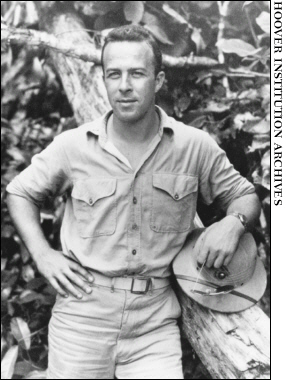
George P. Shultz, Palau Islands, South Pacific, 1944
When the war came, Schlesinger went to work first for the Office of War Information, a writers'group determined to provide the public with an inside, truthful account of the war effort, and then for the OSS.
Shultz, an economics major, was so eager to get involved that he first tried to join the Royal Air Force. His eyesight didn't meet the exacting standards of the British, so he decided to join the Marines in the summer of 1942. One of the first lessons he learned as a lowly trainee stays with him to this day: “My sergeant handed me a rifle and said, âTreat it like your friend. Never point it at anyone unless you're prepared to pull the trigger.' That's a very fundamental lesson.” Many years later, this lesson stayed with him when, as secretary of state, he was involved in U.S. policy decisions that involved much more than one rifle.
For his part, Arthur Schlesinger was also learning lessons that would stay with him forever, and would sharpen his thinking on the social issues that occupy him to this day. As a writer for the Office of War Information, he was sent to the South, where he was shocked by the depth of racial hatred he observed.
Schlesinger was on assignment to find out the truth about reports of excessive drinking around the southern military camps. He quickly learned that the rumors of out-of-control consumption by the soldiers were exaggerated, fueled in part by leftover Prohibitionists and the southern religious establishment. He was much more likely to be told that the real problem was “Negro,” although that was generally not the name used to describe the black Americans who were still being held in a form of bondage in the Deep South.
The wife of an Episcopal minister told him, “The Negroes were better off under slavery . . . they're being stirred up by northern agitators.” She was absolutely sure of the existence of “Eleanor Clubs,” secret cells of black women inspired by Mrs. Roosevelt and determined to escape their lives as domestic workers. The minister's wife said to Schlesinger, “Everyone in the South hates Mrs. Roosevelt.”
Schlesinger finished the war in uniform, attached to the OSS, with the enviable assignment of Paris. He found a room in Montmartre, the artists'area, and began a lifelong love affair with the city.
Shultz, who met his future wife, an Army nurse, on a stopover in Hawaii, returned to the United States after the war and enrolled at the Massachusetts Institute of Technology on the GI Bill. He married Helena “Obie” O'Brien in February 1946.
Schlesinger and Shultz, each in his own way, set off on postwar careers that reflected the patterns of the best of their generation. They had distinguished academic careers while maintaining close ties to the great public-policy questions of the day.
Shultz served on the Council of Economic Advisers during President Eisenhower's administration. He left his post as dean of the University of Chicago School of Business to become President Nixon's secretary of labor, then director of the Office of Management and Budget, and ultimately secretary of the treasury. Shultz's reputation for toughness and fairness was reinforced when IRS computers kicked out President Nixon's tax return for an audit. Shultz authorized the audit to proceed. The president was livid, but his treasury secretary didn't back down.
He left the Nixon cabinet before the president was forced to resign, and became president of the Bechtel Corporation, the global construction powerhouse based in San Francisco. He returned to government as President Reagan's second secretary of state (after Alexander Haig) and stayed in that post through the end of the Reagan era. Shultz was widely credited with siding with Nancy Reagan in urging the president to establish meaningful negotiations with the Soviet Union once Mikhail Gorbachev began the historic changes in the Communist empire.
Henry Kissinger once said of this former World War II Marine, “If I had to entrust the United States to one man, George Shultz would be my choice.”
Schlesinger became a Harvard professor after the war and resumed his prolific writing and teaching career. He was on Adlai Stevenson's campaign staff in 1952 and 1956 and came to know a promising young Harvard graduate who had big ambitions in Massachusetts and national politics, John F. Kennedy. When Kennedy was elected president, Professor Schlesinger went to the White House as a special assistant.
Later, he won his second Pulitzer Prize for his account of the Kennedy years,
A Thousand Days: John F. Kennedy in the White
House.
Schlesinger also wrote
Robert Kennedy and His Times
following the death of his friend. It won the National Book Award.
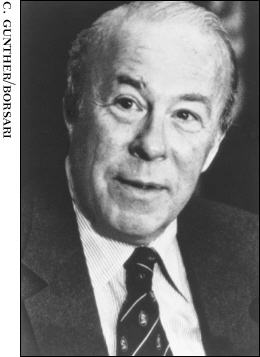
George P. Shultz, as photographed for the jacket of his 1993 book,
Turmoil and Triumph: My Years as Secretary of State
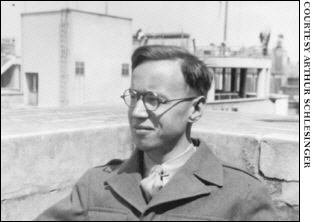
Arthur Schlesinger, wartime portrait
T
HESE TWO MEN,
both now in their eighties, continue to pursue their intellectual passions, and they maintain an avid interest in the world of politics they have moved in and out of with such grace and influence over the last half century.
They both remain long-term optimists. How could they not? They've been personal witnesses to and students of the Great Depression, World War II, the Cold War, the collapse of communism, and the rise of a global economy. They've worked closely with Presidents Eisenhower, Kennedy, Johnson, Nixon, and Reagan, all of whom had triumphs and failures.
Schlesinger, ever the historian, points out that the United States healed itself after the terrible wounds of the Civil War. Theodore Roosevelt, he says, energized the country at the turn of the twentieth century when there was no great international crisis to mobilize public opinion, just as Andrew Jackson had done in the early years of the nineteenth century. Schlesinger shares the belief of many veterans that the sacrifices of his generation, the defeat of communism, and the extraordinary rise of prosperity make it possible for the younger generations to turn away from domestic politics and international affairs. “I am a short-term pessimist but a long-term optimist,” he says. “I think some future crisis will rally the country and bring out new leaders. These are the cycles of history.”
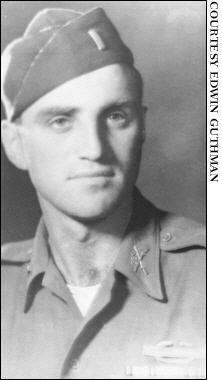
Ed Guthman as a young officer
ED GUTHMAN
“I was so glad to be home. God!”
M
ORE THAN
fifty years later, Ed Guthman can still remember the palpable sense of relief he felt when he returned to Seattle after four years in the infantry, a lieutenant in the 85th Division, having fought his way through North Africa and Italy.
Ed had been wounded in Italy, and after a lengthy hospital stay he was reassigned to
Stars and Stripes,
the Army newspaper, an ideal transfer for the young Washington man who had worked summers at
The Seattle Star
before he was drafted.
So when he came home to Seattle he was able to reclaim his old job, starting out as a courthouse reporter. When the
Star
folded, he was picked up by
The Seattle Times
and went to work investigating the case of a University of Washington professor who had been accused by the Washington State Legislature Un-American Activities Committee of being a Communist sympathizer, a charge the professor vehemently denied.
The committee had promised to publicly resolve the conflicting claims but it failed to issue a report, and Guthman was assigned to the story. His editor, Russell McGrath, was an exacting boss, and when Guthman almost immediately turned up evidence to support the professor's claim of innocence, McGrath told him to check some more before they published. Guthman had already learned that the professor was in Washington State the summer the committee claimed he was at a Communist training camp in New York. McGrath wanted more: check his whereabouts the summer before and the summer after, he instructed Guthman.
It never occurred to Guthman to question his editor's measured approach. He says now, “I think it was my military training; he was my commander and I followed his orders.”
So Guthman dug some more and built a foolproof case: the professor was right, the committee was wrong. In fact, with just a little of editor McGrath's passion for the facts, the committee investigators could have come quickly to the same conclusion.
Finally, McGrath was ready to publish Guthman's story. It was complete, meticulous, and unassailable. The professor had his life back. The pernicious ways of the Un-American Activities Committee were exposed. And Guthman won a Pulitzer Prize.
To this day he credits his military training for the disciplined approachâafter all, he had learned firsthand the advantages of two full years of training before his first combat. His war experience had also instilled in him a deep personal revulsion for tyranny in any form.
When he went on to become press secretary to Attorney General Robert F. Kennedy in the JFK administration, he was surrounded by many with the common experience of World War II and combat. On reflection, Guthman believes that shared experience helped everyone work as a team during crises, such as when the civil rights Freedom Riders' bus was attacked in Alabama. He says, “We knew how to quickly mobilize the resources of the government to take care of those people; every one had a role and executed it.”
After his friend, now senator, Bobby Kennedy was assassinated, Guthman became national editor of the
Los Angeles Times
and, later, editorial-page editor of
The Philadelphia Inquirer.
He's now a professor of journalism at the University of Southern California. In any accounting of the good guys of American journalism, Ed Guthman is on the front page. That's how he'll be remembered: as a thoughtful, compassionate, and resourceful journalist. Most of us who have known him all these years were completely unaware of his Army experience and his Purple Heart, but they are not incidental to him or his life's work.
When his military service does come up, Ed prefers a story about his dean at the University of Washington. When Ed left the university to answer the draft in 1941, he had not completed his ROTC requirements so he was not awarded his degree. Two years later he was a lieutenant, leading an infantry platoon on a hilltop in Italy. A large package arrived from Dean Lauer at the university with a note of explanation: “Dear Ed, We think you've fulfilled your military obligation. Here's your degree.”
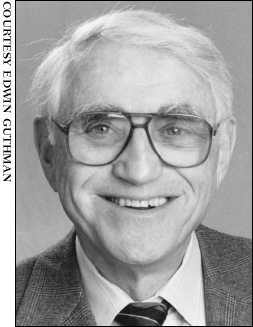
Ed Guthman
